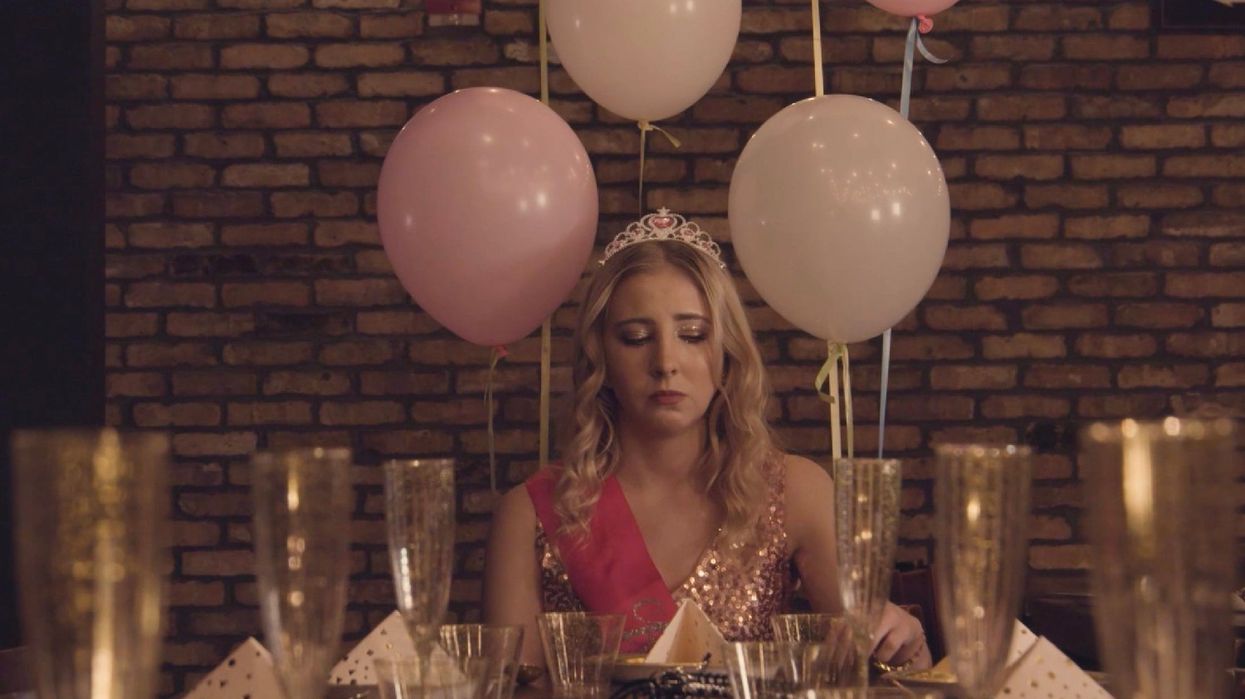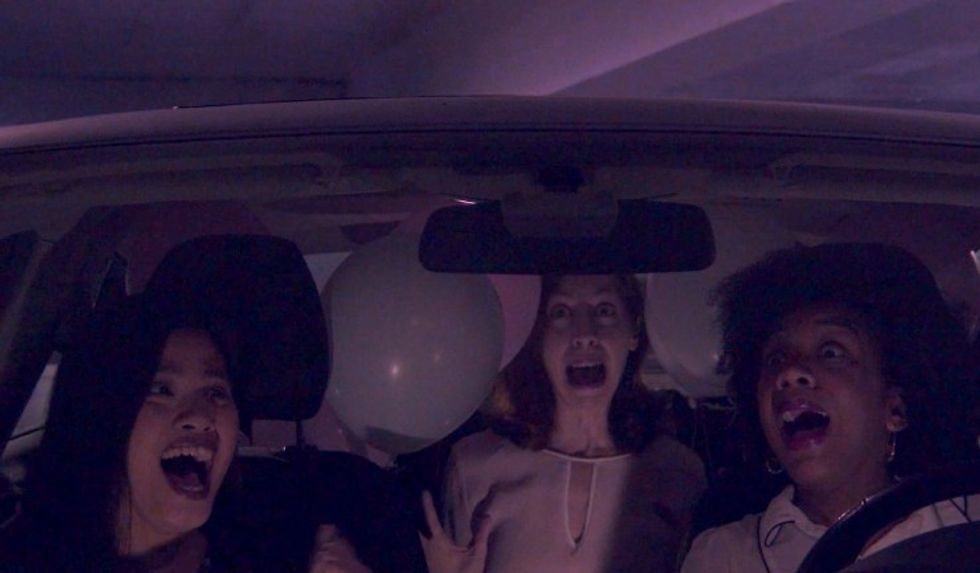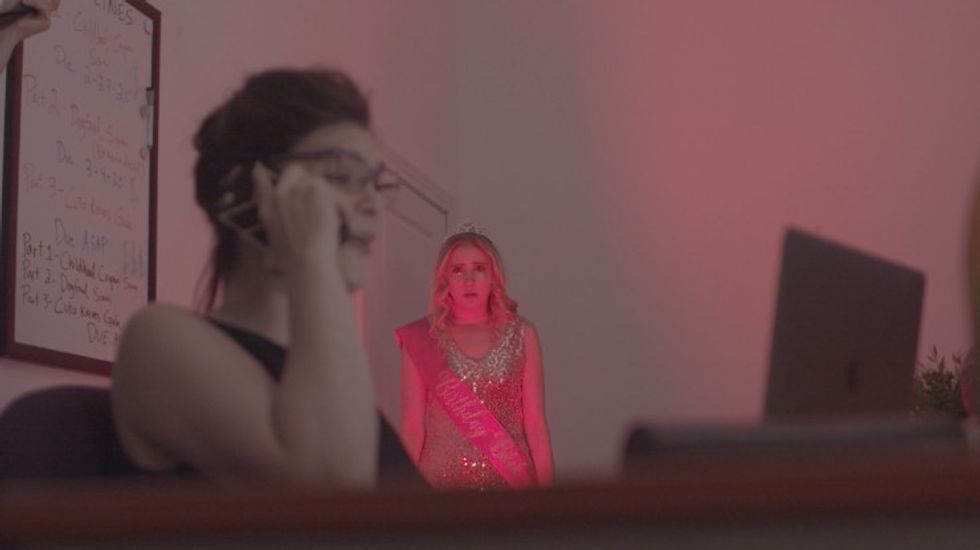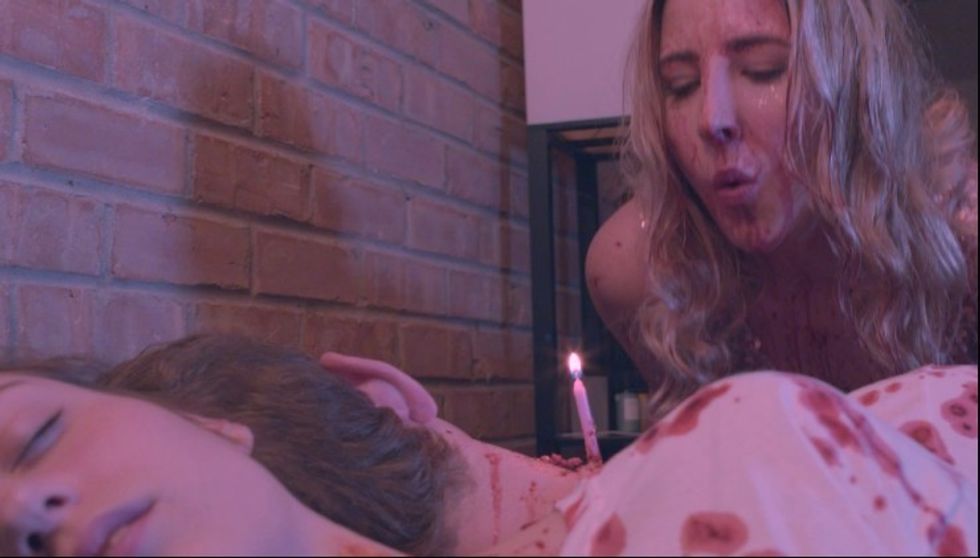How to Make Low-Budget Horror That’s Actually Good? Add Comedy!
Paired with a Pocket 4K and buckets of fake blood, filmmaker Lesley Hennen invokes the Unholy Trinity: anxiety, fear, and laughing out loud.

Is horror comedy the best of the genre?
Think American Werewolf in London and Evil Dead II or Shaun of the Dead. They all have terrifying situations like being eaten in the moors at night, unleashing hell on earth, and losing all your best vinyl in the zombie apocalypse.
And odds are, we’ll be watching these movies for decades to come, while the plethora of their serious horror counterparts fade into obscurity. Why? There’s something much more valuable about horror that brings comedy—if you can pull it off!
For filmmaker Lesley Hennen, it all started with the feeling you get when you make a room full of people laugh. (And that started in the first grade for her.) After a few years in a soul-sucking 9-to-5, Hennen discovered screenwriting, and eventually, her voice.
Hennen spoke with No Film School to talk about how she comes up with ideas for horror-comedy projects, changing Hollywood for disabled filmmakers, and shooting her low-budget short Birthday Bitch.
Here’s the trailer. The full film comes out on Halloween!
No Film School: From a filmmaker's perspective, what do you see as the inherent connection between comedy and horror?
Lesley Hennen: In both genres, there’s this core element of surprise, and depending on the context of the surprise, it’s either going to make you laugh or make you scream. And sometimes it does both! Like if a jumpscare in a horror movie really gets you, you’re scared for a second and then probably laugh at yourself for falling for the trope. Or if you’re watching an especially campy horror movie (my favorite kind) you might laugh at some of the more ridiculous or exaggerated elements of the film, even though they’re still technically based in horror.
I also think comedy and horror work really well together when it comes to satire, because when you take something and sort of put it under this “lens of truth” if you will, where you’re pointing out its flaws or making some kind of stance on the topic, that’s probably going to result in a more comedic tone, because you’re sharing your truth about something in a way that feels unexpected or goes against the grain. Then when you add in a layer of horror on top of that, you can really amplify your message by playing into whatever underlying fears that people might have about the topic, and having fun with various horror tropes and seeing how you can use them to really shape the overall message that you want people to have from your film. Or TV episode, or short story, etc. or really any kind of art.
NFS: How did you write for the comedy-horror tone in your upcoming short film, Birthday Bitch?
Hennen: The whole premise of Birthday Bitch really started as a joke—I came up with it during this pitching exercise in one of my writing classes at Harold Ramis Film School where we were supposed to pitch three ideas in five minutes and get feedback from the rest of the class on which idea they would want to see most based on our one-sentence pitch.
I had written down this sort of half-baked idea of a character who’s always been a people-pleaser, someone who never wants to inconvenience anyone, etc. but then something happens that finally makes them snap. And I thought a birthday party would be a funny place to see that character, so it evolved into the premise of a woman who goes on a killing spree after no one shows up to her birthday party. Another friend and classmate offered the idea that it would be fun to play around [with] the idea of how each guest was murdered with a birthday-related object, and then the rest of the idea sort of took off from there.
As far as the tone of the writing, I tried to really lean into the feeling of anxiety that often comes with hosting a party—especially birthday parties, which I’ve always felt like have this sort of extra layer of pressure on them, because they’re tied to these arbitrary milestones and aging, etc. I also tried to focus on visualizing that sort of nagging voice in the back of your mind that’s like, “what if no one comes to my party?"
Once I had that underlying premise, a lot of the comedy for me came from seeing how far I could push the believability aspect of the murders. Like realistically, a person probably wouldn’t die from (spoiler alert) being choked with the string from a party hat, or from their ears bleeding out due to the high-pitched sound of air being let out of a balloon. But what if they did? What would that look like?
Hennen: I also had a lot of fun coming up with the dialogue for both Marissa (the main character of the film) and the people she was murdering. Because at the end of the day, none of the characters really deserve what’s happening to them, so having to sort of put myself on both sides of these interactions was really fun. Like, what would I actually want to say if I were in this situation? I think improv really helped me with writing dialogue, because so often the line that gets the biggest laugh during an improv scene is just something that you blurt out in the moment as a gut reaction, not something that you say with the intention of being funny, and I think the same general rule applies to writing dialogue for characters in a script as well.
NFS: What was production like on the film?
Hennen:Birthday Bitch was very much a “no-budget” shoot (in reality I probably paid a little less than $1,000 for props, meals, wardrobe, and film festival entrance fees, which I think is important to clarify that even if you’re making a no-budget film, you still need to anticipate some costs for stuff like that). I was also really lucky in that I was able to rent a lot of our film equipment for free through Harold Ramis Film School, and my DP already had a Blackmagic Pocket Cinema Camera 4K, so that’s what we ended up shooting on.
All of my actors were either friends from Second City or local actors that we had been working with throughout the year. One of my classmates used to work doing makeup at a haunted house, so he took point on all of the fake blood and SFX. I also filmed mostly in and around Second City locations that we got for free, as well as at my own apartment and a nearby public park. Another friend of mine also offered to edit the film for free which saved a ton of money, and she also sourced all of the music and sound effects which ended up giving the film a really fun 80s synth vibe which was so perfect and something I hadn’t even considered until she tried it out.
Basically, I couldn’t have made Birthday Bitch without a ton of volunteered time from some really great friends, which is something I definitely don’t take for granted, and I think really goes to show how collaborative this industry is and how important it is to maintain good relationships with people you love to work with.
NFS: What did you want the look and feel of Birthday Bitch to be, and how did the Blackmagic Pocket Cinema Camera 4K do?
Hennen: I knew I really wanted it to be colorful and campy. When I was putting together a lookbook before the shoot I included lots of images from Carrie, Kill Bill, and the Final Destination movies, and I think having essentially no budget really helped us get creative and lean into the more campy aspects of the film just out of sheer necessity.
I’m so glad that we did shoot on the Pocket 4K, because it made the whole process so easy. It’s a pretty lightweight and portable camera, so we were able to do lots of handheld shots and have fun with different camera movements without having to do a ton of different camera setups, etc. Plus the quality of the footage was great. We really didn’t have to do much in terms of color correction other than playing around with different colors to affect the mood and tone of the film.
NSF: You’re a fellow of this year's Blackmagic All Access: Disabled Filmmakers on the Move program. How has that been, and what important changes would you like to see going forward in the film industry to genuinely include filmmakers with disabilities?
Hennen: Being part of the Blackmagic All Access Fellowship this year has been a great experience. It always helps to be around other disabled writers and filmmakers who truly understand all the different nuances and barriers that go along with navigating this industry that’s been so inaccessible to so many people for so many years. It’s been great getting to talk to so many different executives throughout the program who are genuinely interested in hearing more stories from disabled filmmakers. It feels like the industry is finally getting to this turning point where people are realizing that audiences want to see (and will pay to see) themselves represented on-screen.
I think the most important change I’m hoping to see going forward with the film and TV industry when it comes to disabled writers, filmmakers, and the overall on-screen representation of people with disabilities, is to see more disabled creatives being hired to work in all aspects of the storytelling process. We need more disabled people in writers’ rooms, in editing rooms, working as production assistants, directors, executive producers, and everything in between. The only way to ensure truly authentic representation is by hiring people with that lived experience to tell the stories.
Also, I’d love to see more disabled people on-screen where their storyline doesn’t solely revolve around their disability. I think it’s so important to highlight a variety of disabled experiences on-screen, but I also think it’s equally important to just see disabled people living their lives. Like in my real day-to-day life, the only time I ever really think about my disability is when someone else points it out, or when I encounter something that isn’t accessible to me. So I’d love to just watch a movie or a TV show where we get to see a disabled character who is a crucial part of the story, but their disability just happens to be a part of their identity and isn’t used as a plot device.
NFS: What is your advice for other filmmakers?
Hennen: My main piece of advice for other filmmakers is to think about the one story you really want to tell, but are afraid to tell for some reason. And then find a way to tell it. We all have one, if not more of these stories. They’re usually the stories that feel the most personal to us, like no one else in the world could possibly relate to them. I’ve found that these are the stories that end up resonating the most. I guarantee you that there are still underlying themes and feelings that other people will relate to in their own unique way. At the end of the day, it’s important to tell those super-specific and personal stories, so that other people can feel less alone in those experiences, and inherently we can create more authentic representation for all different types of people.















